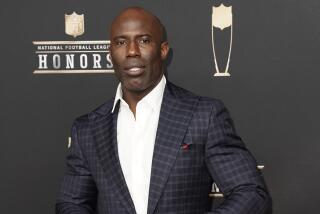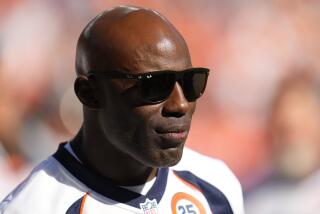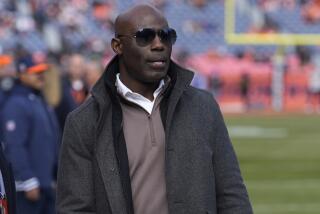Column: United dragging a passenger from overbooked flight was lesson in stupidity

A passenger was dragged out of a United Airlines plane due to the airline overbooking the flight, creating yet another PR nightmare for United Airlines.
- Share via
There’s nothing like the sight of a passenger being forcibly dragged from an overbooked flight to remind people that, when it comes to customer service, many companies are thoughtless, insensitive, inconsiderate, irresponsible and just plain stupid.
You’ve probably seen the video (if not, check it out pronto). It shows a plainclothes cop wrestling a man from his seat on a United Airlines flight in Chicago and hauling his limp body down the aisle Sunday night.
There’s some screaming, some shouts and a general sense of astonishment and outrage among other passengers, some of whom, not surprisingly, whipped out their phones and recorded the whole sorry episode.
“Who thought this would be a good idea?” wondered Michael McCall, a professor of hospitality business at Michigan State University. He was among a number of customer-service experts I spoke with Monday as the United video went viral.
“Now you’re looking at a lawsuit,” he said. “And that’s nothing compared to the public-relations nightmare.”
We’ve all been on flights with unruly passengers. This wasn’t such a case.
This was a guy — reportedly a doctor — minding his own business as United started bumping passengers from the flight because the airline sold more tickets than it had available seats, which is about as screwed-up a policy as you’ll find in the corporate world.
They’re deliberately selling more of something than they know they have in inventory. What other business gets away with that?
Yes, it’s legal. Airlines reserve the right to oversell flights in the fine print of tickets. Yes, it happens all the time. And typically it goes off without a hitch.
United followed the usual drill. First it asked for volunteers to take a later flight. It offered as much as $800 per volunteer plus a hotel stay. No one accepted.
Then the airline selected four passengers for involuntary bumping. Three left without incident. The fourth remained in his seat.
After repeatedly asking the guy to leave, United staff summoned the city-run Chicago Aviation Department — airport police — which handled the situation with all the finesse of lions pouncing on a gazelle.
Oscar Munoz, the airline’s chief executive, said in a statement that this was “an upsetting event to all of us here at United.”
“I apologize for having to re-accommodate these customers,” he said. “Our team is moving with a sense of urgency to work with the authorities and conduct our own detailed review of what happened. We are also reaching out to this passenger to talk directly to him and further address and resolve this situation.”
Style note: Dragging a passenger from a plane isn’t “re-accommodating” him. It’s assault. Maybe not in a legal sense. But we all know what it means if it quacks like a duck.
United obviously was in a hard place. Even though it oversold the flight, it still had a responsibility to get passengers to their destination in a timely manner. It didn’t have the luxury of spending hours negotiating.
The experts I spoke with said the airline made two key mistakes:
First, it didn’t remedy the overbooking while passengers were still in the gate, before they’d boarded the aircraft.
Second, it allowed the situation to escalate out of the airline’s control by calling in the cops, who had no stake in making United look friendly. Their sole task was to get the guy off the plane, using brute force if necessary.
“This is wrong on so many dimensions of what we know about customer service,” said Mary Gilly, a marketing professor at UC Irvine. “You don’t look for ‘volunteers’ after passengers have already boarded the flight.”
Worse, the flight reportedly was overbooked because United needed the seats for its own employees, who had to fly elsewhere for different shifts.
“They’re saying company employees were a priority over a paying customer,” said Michigan State’s McCall. “Why would anybody do that?”
Paul Fombelle, an associate professor of marketing at Northeastern University, said that “the right way to handle a situation like that is not to get in a situation like that.”
“Once the guy has sat down, the airline has to honor that,” he said. “To pull him off is heartbreaking.”
The tricky part here is that the only realistic solution is to raise the compensation offered passengers until somebody accepts. Eight hundred bucks seems like a lot of money, but the fact that nobody took the offer clearly shows that the marketplace — that is, passengers — placed a higher value on their seats.
I can guess why United didn’t start upping the ante. Consumers aren’t dumb. Once they see what’s going on, they’ll just keep mum and see how high the airline is prepared to go.
Tough patooties, the experts said (I’m paraphrasing). This was a problem of United’s making and the airline had no reasonable choice but to offer more money for being bumped.
“I’m surprised they didn’t immediately go to a thousand dollars per seat,” McCall said. “That would still be cheap compared to what they now face.”
This episode isn’t just a cautionary tale for the airline industry, which has never lacked for ways to make itself look bad. It’s a reminder to all businesses that consumers may obsess about low prices, but there are lines that still can’t be crossed in the pursuit of thriftiness.
Also, everyone now carries cameras. There wasn’t a chance that photos and video of a passenger being dragged off a flight wouldn’t be online within minutes.
For any company to operate as if this isn’t the world we now inhabit is both reckless and foolish.
“I think what we’ve seen is that United optimizes profit but not customer relationships,” Fombelle said.
And that’s precisely the sort of thing that can cause air travelers to re-accommodate their loyalties.
Para leer esta historia en español haga clic aquí
David Lazarus’ column runs Tuesdays and Fridays. He also can be seen daily on KTLA-TV Channel 5 and followed on Twitter @Davidlaz. Send your tips or feedback to david.lazarus@latimes.com.
More to Read
Inside the business of entertainment
The Wide Shot brings you news, analysis and insights on everything from streaming wars to production — and what it all means for the future.
You may occasionally receive promotional content from the Los Angeles Times.











